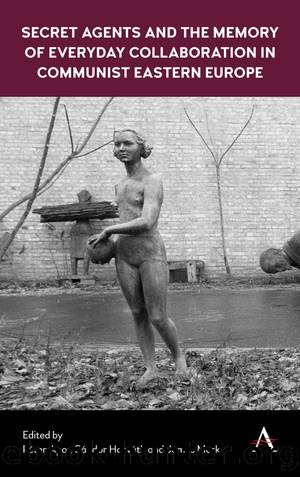Secret Agents and the Memory of Everyday Collaboration in Communist Eastern Europe by Péter Apor Sándor Horváth James Mark

Author:Péter Apor, Sándor Horváth, James Mark [Péter Apor, Sándor Horváth, James Mark]
Language: eng
Format: epub
Tags: Nonfiction, History, Eastern Europe, Modern, 20th Century
ISBN: 9781783087259
Publisher: Anthem Press
Published: 2017-09-27T04:00:00+00:00
Conclusion: Individual Strategies, Competing Loyalties and the Legitimacy of the System
Teachers at the Faculty struggled for at least minimal autonomy, struggled to continue in their profession (in which they were considered experts) and struggled to retain the opportunity to influence students, one another, the senior officials of the party, and people at the Ministry of Education. In a continuous process of negotiation, they endeavored (though of course each to a different extent) to combine several layers of loyalty and often-contradictory aims: the desire to be given promotions at work and to advance in their academic careers, the necessity to be obedient in order to do so, the sense of loyalty to the values of scholarship and knowledge, the desire to maintain good relationships with their students and efforts to achieve at least some independence.
The politics of history and the forms of collective memory that were dominant after 1989 have exerted a strong influence on how individual stories have been and are being constructed and remembered. The prevailing image of a criminal, or at least degenerate, regime has produced an opposition between people who helped run the system and collaborated with it, on the one hand, and those who resisted, on the other. People who were adults in the 1970s and 1980s generally want to belong to the second category, and they seek to hide acts which cannot be interpreted as a form of resistance (even according to the most well-intentioned interpretation, for instance, collaboration with the secret police or high party functionaries) and even blame themselves for having failed to resist in such cases. This interaction between collective and individual memory produces an extremely black-and-white image of post socialist society and politics, which makes it difficult to talk about moral dilemmas or the different strategies adopted by historical actors.
In fact, there was a highly stratified society in the microcosm of the Faculty, concealed below the apparent âgray of Normalization.â Individual actors derived their power from their positions in the party and at the Faculty; no less important was their direct link to the individual interest groups inside the Faculty party organization and outside it. Closely connected to the distribution of power was the distribution of duties and obligations (toward the party, which was restored after 1968, toward superior government officials, that is, the university and the ministry, and also toward the StB). That did not mean, however, that people outside the power structure survived only in some kind of hidden, independent niches. Even nonparty members were faced with a whole range of pressures, particularly those whose party membership had been cancelled and were kept under relatively thorough surveillance. In contrast, party members who had successfully been vetted and were not among the suspected and marginalized could often, without much difficulty, travel to academic conferences and participate in various study-stays in Western countries (providing they spoke the necessary languages); they had better access to scholarly and secondary literature from abroad and enjoyed, particularly in the 1980s, the comparative freedom to hold seminars on more-general subjects less closely related to their fields.
Download
This site does not store any files on its server. We only index and link to content provided by other sites. Please contact the content providers to delete copyright contents if any and email us, we'll remove relevant links or contents immediately.
| Espionage | Hoaxes & Deceptions |
| Murder & Mayhem | Organized Crime |
| Serial Killers | White Collar Crime |
Mindhunter: Inside the FBI's Elite Serial Crime Unit by John E. Douglas & Mark Olshaker(9324)
Wiseguy by Nicholas Pileggi(5770)
Room 212 by Kate Stewart(5105)
Hitman by Howie Carr(5089)
Secrecy World by Jake Bernstein(4741)
Killers of the Flower Moon: The Osage Murders and the Birth of the FBI by David Grann(4435)
Papillon (English) by Henri Charrière(4263)
Breaking Free by Rachel Jeffs(4216)
Killers of the Flower Moon by David Grann(4042)
Say Nothing by Patrick Radden Keefe(3975)
American Kingpin by Nick Bilton(3876)
The Secret Barrister by The Secret Barrister(3699)
Molly's Game: From Hollywood's Elite to Wall Street's Billionaire Boys Club, My High-Stakes Adventure in the World of Underground Poker by Molly Bloom(3531)
Mysteries by Colin Wilson(3447)
In Cold Blood by Truman Capote(3378)
Signature in the Cell: DNA and the Evidence for Intelligent Design by Stephen C. Meyer(3132)
I'll Be Gone in the Dark by Michelle McNamara(3082)
Rogue Trader by Leeson Nick(3040)
Bunk by Kevin Young(2993)
